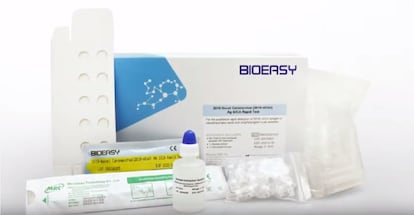Spain seeks refund for defective coronavirus tests, after replacement kits also prove faulty
The Health Ministry has canceled an entire order of antigen kits from Chinese company Bioeasy, after already sending back a first batch

The Spanish government is trying to get back the money it paid for 640,000 antigen coronavirus tests that it purchased via a Spanish distributor from a Chinese company called Bioeasy. The move comes after the health authorities found that the kits – which were meant to replace another lot that was found to be faulty – don’t work either. As happened the first time around, these tests do not have the sensitivity required to detect the virus, meaning that there is a high chance that they won’t detect the coronavirus in a person who has been infected.
Bioeasy sent a sample of these kits, which use a fluorescence method, and they were analyzed by the Carlos III Health Institute in Madrid. On seeing that they weren’t sufficiently sensitive, the government decided to cancel the entire order. The Health Ministry has confirmed to EL PAÍS that the process has begun to recover the money that was paid for the kits.
The Spanish government has now rejected the use of antigen tests, in which great hopes had been placed just a few weeks ago
The ministry has still not made public how much the order from Bioeasy cost, nor has it identified the mysterious Spanish intermediary who carried out the operation. The Health Ministry is not publishing the purchasing contracts for health material during the coronavirus crisis, despite the fact that the Public Procurement Advisory Board, which reports to the Finance Ministry, has issued a report stating that it should.
At the end of March, the Health Ministry was forced to return 58,000 of the so-called rapid coronavirus tests from a total of 640,000 that it had purchased from the same company. The kits were due to be used for health professionals as well as workers and residents in senior homes.

They had received two batches, a first with 8,000 units and a second with 50,000. When a number of laboratories in Madrid hospitals determined that they had a 30% sensitivity, rather than the 80% specified, the Health Ministry opted to return the tests and cancel the next deliveries. The company suggested replacing the order with antigen kits, which were also rapid but that required a machine to read the result. The Chinese company was going to include these machines free of charge to compensate for the problems.
After EL PAÍS revealed that the tests did not work properly, the Chinese embassy in Spain sent out a tweet warning that Bioeasy did not have a license in China. The government responded saying that the company did have permission to export to the European Union and that it had purchased the rapid tests via a Spanish distributor, and not directly from the manufacturer. The Spanish trade association for medical and health material, Fenin, has stated that it is not one of its members.
The ministry has still not made public how much the order from Bioeasy cost
Shortly after this fiasco, and concerned about the international image of its products, China decided to take control of its health material exports. Since the beginning of the month, firms that manufacture these products will have to be officially registered in China, as well as counting on the corresponding foreign approval. In the case of Bioeasy, the tests had been approved by two European certifying companies that do not analyze the quality of the product, but rather are limited to reviewing the documentation supplied.
The purchase of these tests came before Spain closed a deal with China to buy health equipment worth €532 million. China provided a list of trusted suppliers of the products. According to Health Minister Salvador Ila, the deal included the supply of masks for patients and professionals during an eight week period, as well as 5.5 million serological tests. The latter kits detect antibodies, and as such do not detect the disease in the early stages of infection. These are the ones that are being used in order to increase the number of diagnostic tests being carried out, as recommended by the World Health Organization (WHO).
The Spanish government has now rejected the use of antigen tests, in which great hopes had been placed just a few weeks ago. This kind of test is now not even being used in the latest diagnostic protocols for the Covid-19 disease. Spain is entering the next phase of the epidemic, which is deconfinement and deescalation, using antibody tests and PCR tests, the latter being the most trustworthy and the most expensive. These two methods will be used to detect those who have the virus even before they have symptoms, and to place them in isolation as soon as possible.
English version by Simon Hunter.
Tu suscripción se está usando en otro dispositivo
¿Quieres añadir otro usuario a tu suscripción?
Si continúas leyendo en este dispositivo, no se podrá leer en el otro.
FlechaTu suscripción se está usando en otro dispositivo y solo puedes acceder a EL PAÍS desde un dispositivo a la vez.
Si quieres compartir tu cuenta, cambia tu suscripción a la modalidad Premium, así podrás añadir otro usuario. Cada uno accederá con su propia cuenta de email, lo que os permitirá personalizar vuestra experiencia en EL PAÍS.
¿Tienes una suscripción de empresa? Accede aquí para contratar más cuentas.
En el caso de no saber quién está usando tu cuenta, te recomendamos cambiar tu contraseña aquí.
Si decides continuar compartiendo tu cuenta, este mensaje se mostrará en tu dispositivo y en el de la otra persona que está usando tu cuenta de forma indefinida, afectando a tu experiencia de lectura. Puedes consultar aquí los términos y condiciones de la suscripción digital.








































